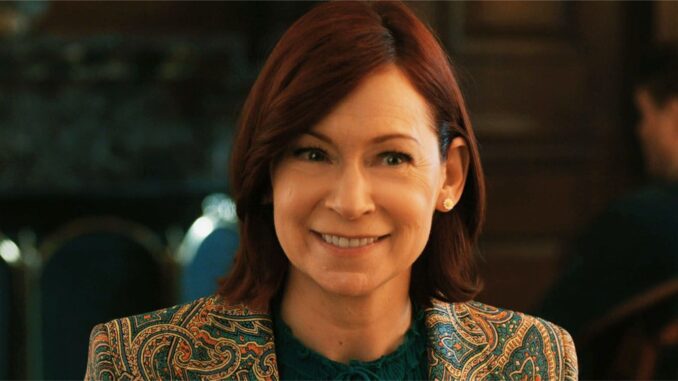
The Buoyant Brilliance of Elsbeth: A New Chapter in Legal Lore
In an era of peak television, where the screen often reflects the world's anxieties with grim resolve, a new kind of light has dawned in the well-trodden corridors of the legal drama. Elsbeth, the latest iteration from the acclaimed minds behind The Good Wife and The Good Fight, has captivated critics and audiences alike, earning resounding praise as the next big legal hit. But what is it about this seemingly anachronistic, brightly-hued procedural that has critics so effusive, declaring it a beacon in the often-somber legal landscape? The answer lies in its audacious character, its inverted yet intricate mysteries, and its refreshing, optimistic spirit that feels less like a retread and more like a vibrant, necessary evolution of the genre.
At the pulsating heart of Elsbeth's undeniable charm is its eponymous lead, Elsbeth Tascioni, portrayed with unparalleled dexterity by the Emmy-winning Carrie Preston. In a genre often dominated by slick, morally ambiguous lawyers or stoic, tortured detectives, Elsbeth is a delightful anomaly. She is a woman who seems perpetually disarmingly cheerful, scatterbrained, and utterly out of step with the high-stakes world of New York City's elite criminals and power players. Yet, beneath the brightly colored scarves and the seemingly tangential observations lies a mind of unparalleled acuity. Critics laud Preston's performance for not just embodying a quirky character, but for making Elsbeth's unique thought process a veritable superpower. She is less a lawyer in the traditional sense and more a human divining rod, sifting through the noise to pinpoint the precise, often overlooked detail that cracks the case wide open. This character-driven magnetism elevates the show beyond a mere procedural; it transforms it into an intellectual delight, akin to watching a master artisan at work, where the tools are seemingly innocuous questions and observations, and the product is irrefutable truth.
Beyond its singular lead, Elsbeth ingeniously subverts the very structure of the legal procedural, contributing significantly to its "next big hit" status. Unlike the traditional "whodunit," Elsbeth embraces the "how-catch-em" format, popularized by shows like Columbo. Each episode begins by revealing the perpetrator and the crime, shifting the focus from the mystery of who did it to the compelling puzzle of how Elsbeth will figure it out. This narrative choice liberates the storytelling from the often-formulaic beats of evidence gathering and suspect interrogation, allowing the writers to indulge in more playful, intricate cat-and-mouse games. Critics are quick to point out that this format permits a deeper exploration of character, motive, and the often-absurd lengths people go to cover their tracks. The joy comes not from a sudden reveal, but from watching Elsbeth’s seemingly disjointed inquiries slowly, meticulously, and hilariously coalesce into an undeniable case. It's a masterclass in elegant unraveling, proving that suspense isn't solely derived from the unknown, but also from the exquisite process of discovery.
Adding another vibrant layer to Elsbeth's critical acclaim is its distinct tone and aesthetic, which offers a refreshing antidote to the pervasive gloom often associated with modern legal dramas. While its predecessors, The Good Wife and The Good Fight, delved into the moral complexities and cynical realities of law and politics, Elsbeth radiates a buoyant optimism. Set against the sparkling backdrop of New York City, the show embraces a palette of vibrant hues, from Elsbeth's wardrobe to the sets, creating an atmosphere that is both sophisticated and inviting. The humor is sharp, witty, and often unexpected, woven seamlessly into the investigative process. This isn't a show that wallows in despair or moral ambiguity; instead, it celebrates the triumph of intellect and ingenuity, all delivered with a smile. Critics highlight this as a crucial factor in its appeal: Elsbeth provides intellectual stimulation without emotional exhaustion, offering a much-needed dose of comfort viewing that doesn't sacrifice intelligence or originality.
Ultimately, Elsbeth's designation as the "next big legal hit" is not simply hyperbole, but a recognition of its ability to carve out a unique, vital space within a well-established genre. It pays homage to the legacy of smart, character-driven legal dramas while daring to be different. It demonstrates that a show can be deeply intelligent, incredibly funny, and profoundly optimistic, all at once. By centering its narrative on a truly original character, embracing a clever structural innovation, and cultivating an irresistibly cheerful tone, Elsbeth doesn't just entertain; it reinvents. It reminds us that justice, even in the most intricate cases, can be found not through brute force or cynicism, but through the unassuming brilliance of a genuinely good, remarkably smart individual, and that, perhaps, is the freshest legal argument of all.
